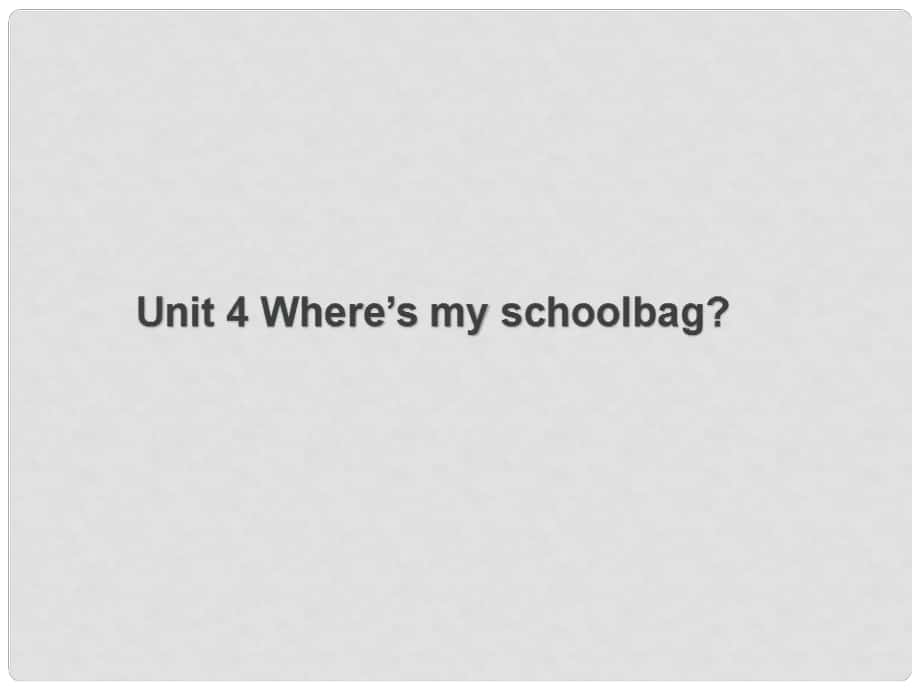《七年級英語上冊 Unit 4 Where's my schoolbag Period 1課件1 (新版)人教新目標版》由會員分享����,可在線閱讀,更多相關《七年級英語上冊 Unit 4 Where's my schoolbag Period 1課件1 (新版)人教新目標版(30頁珍藏版)》請在裝配圖網(wǎng)上搜索����。
1、Unit 4Unit 4Section A 1a-2cWhats this? What are these? Oh, a nice room!Oh, a nice room!table/ei/bed/e/bookcase/ei/sofa/u/chair/e /table /ei/bed /e/ bookcase /ei/sofa /u/ /books schoolbag /keys chair/e /1. table _2. bed _3. bookcase _4. sofa _5. chair _6.schoolbag _7. books _8. keys _behgdafc1a Match
2�、 the wordswith the things in the picture.Wheres the baseball?Its on the table. Wheres the schoolbag?Its under the table. Wheres the ruler?Its in the pencil box.Where are the books?Theyre on the bed.WHERE ARE THE BASEBALLS?Theyre on the chair.4231b Listen and number the things in the picture1-4.A: Wh
3、eres the? ( Where are the?)B: Its (They are )Pairwork 觀察與思考觀察與思考1 1�����、聽力1b中用_ 引導的特殊疑問句來詢問物品位置�����,單數(shù)句子用be動詞_,復數(shù)句子用be動詞_. 回答分別為_+ 方位介詞短語�����;或_+方位介詞短語����?!靖櫽柧毟櫽柧?】Wheres the _? Its _ the _.bedschoolbagonWhere _ the books ? _ in the _.areTheyrebookcaseWhere _ the pencils ? _ in the _.Wheres the _? Its _ the _.cu
4�����、pontableareTheyrepencil boxWhere _ the keys ? _ _ the pencil case.areTheyreunderWheres the _? Its _ the _.bagonchair2aListen and number the things 1-6 when you hear them.聽錄音�,按聽到的順序給這些物品編號1-6。12365412342b Listening : Number the things in the picture. (聽力:將這些物品的序號(聽力:將這些物品的序號(1-6)標在圖上)標在圖上)12346655觀察與
5����、思考觀察與思考21.詢問單數(shù)物品時,用一般疑問句詢問單數(shù)物品時����,用一般疑問句_,其答語用其答語用_.2.詢問復數(shù)物品時,用一般疑問句詢問復數(shù)物品時�����,用一般疑問句_,其答語用其答語用_.【跟蹤訓練跟蹤訓練2】A : Where is/ are the ?B : I dont know. Is it on/in/under? ( Are they on/in/under ?)A : Yes, it is./ No,it isnt. Its (Yes, they are. /No, they arent. Theyre)Pairwork 【課堂練習課堂練習】1�、選擇填空( ) 1. _ your h
6�、at? A. Where B. Wherere C. Wheres( ) 2. Is his pencil box _ the bookcase? A. in B. at C. under( ) 3. The tapes _ in the box. A. am B. is C. are 2、句型轉(zhuǎn)換(1) The pictures are on the wall.(對劃線部分提問)(2) Is the CD on the sofa?(作肯定回答)(3) Are the chairs next to the table?(作否定回答)1.聽錄音跟讀�,熟練背誦1b和2a中的對話����。2.根據(jù)課本中圖片提示����,分別用單數(shù)和復數(shù)形式造兩組對話并寫下來。
 七年級英語上冊 Unit 4 Where's my schoolbag Period 1課件1 (新版)人教新目標版
七年級英語上冊 Unit 4 Where's my schoolbag Period 1課件1 (新版)人教新目標版

